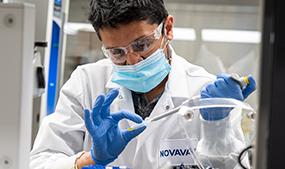Novavax’s Updated Protein-based Non-mRNA COVID-19 Vaccine Available in Taiwan Vaccination Centers
Novavax’s updated protein-based non-mRNA COVID-19 vaccine is now available for use in Taiwan for the prevention of COVID-19 in individuals aged 12 and older. Doses have been distributed by Taiwan’s Centers for Disease Control (CDC) and are now available at vaccination clinics across the country. The addition of a protein-based vaccine will diversify the country’s vaccine portfolio and provide a non-mRNA option to help protect against COVID-19.
Non-clinical data showed that Novavax's updated COVID-19 vaccine induced functional immune responses against XBB.1.5, XBB.1.16 and XBB.2.3 variants. Additional non-clinical data demonstrated that Novavax's vaccine induced neutralizing antibody responses to subvariants JN.1, BA.2.86, EG.5.1, FL.1.5.1 and XBB.1.16.6 as well as CD4+ polyfunctional cellular (T-cell) responses against EG.5.1 and XBB.1.16.6. These data indicate Novavax's vaccine can stimulate both arms of the immune system and may induce a broad response against currently circulating variants.1, 2
Forward-Looking Statements
Statements herein relating to the future of Novavax, its operating plans and prospects, including the availability of its updated XBB version of its Novavax COVID-19 Vaccine, Adjuvanted (2023-2024 Formula) (NVX-CoV2601) and the timing of delivery and distribution of its vaccine in Taiwan are forward-looking statements. Novavax cautions that these forward-looking statements are subject to numerous risks and uncertainties that could cause actual results to differ materially from those expressed or implied by such statements. These risks and uncertainties include, without limitation, challenges satisfying, alone or together with partners, various safety, efficacy, and product characterization requirements, including those related to process qualification and assay validation, necessary to satisfy applicable regulatory authorities; difficulty obtaining scarce raw materials and supplies; resource constraints, including human capital and manufacturing capacity, on the ability of Novavax to pursue planned regulatory pathways; challenges or delays in obtaining regulatory authorization for its product candidates, including its updated XBB version of its COVID-19 vaccine in time for the fall 2023 vaccination season or for future COVID-19 variant strain changes; challenges or delays in clinical trials; manufacturing, distribution or export delays or challenges; Novavax's exclusive dependence on Serum Institute of India Pvt. Ltd. for co-formulation and filling and the impact of any delays or disruptions in their operations on the delivery of customer orders; challenges meeting contractual requirements under agreements with multiple commercial, governmental, and other entities; and those other risk factors identified in the "Risk Factors" and "Management's Discussion and Analysis of Financial Condition and Results of Operations" sections of Novavax's Annual Report on Form 10-K for the year ended December 31, 2022 and subsequent Quarterly Reports on Form 10-Q, as filed with the Securities and Exchange Commission (SEC). We caution investors not to place considerable reliance on forward-looking statements contained in this press release. You are encouraged to read our filings with the SEC, available at www.sec.gov and www.novavax.com, for a discussion of these and other risks and uncertainties. The forward-looking statements in this press release speak only as of the date of this document, and we undertake no obligation to update or revise any of the statements. Our business is subject to substantial risks and uncertainties, including those referenced above. Investors, potential investors, and others should give careful consideration to these risks and uncertainties.
References:
- Wherry EJ, Barouch DH. T cell immunity to COVID-19 vaccines. Science. 2022;377(6608):821-822. doi:10.1126/science.add2897.
- Markov PV, Ghafari M, Beer M, et al. The evolution of SARS-CoV-2. Nat Rev Microbiol. 2023;21(6):361-379. doi:10.1038/s41579-023-00878-2.



